You arrive at Windhoek's International Airport where you will be met by our motor home team and driven the short distance to the depot where you will be familiarised with all the features of your motor home. Nearby is your overnight accommodation the Trans Kalahari Inn where you can have a relaxing rest on your first night.
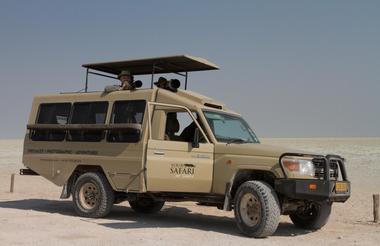
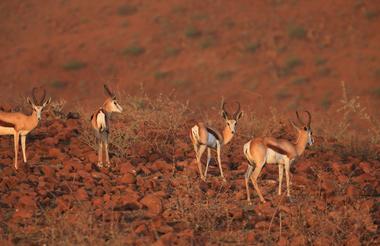
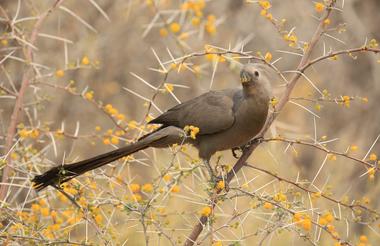
A motor home tour of Namibia is a great way to see this amazing country with a family. The vehicles are very well equipped with everything you need to make your camping experience a luxury.They are a perfect way to enjoy the long open roads in this remarkable country
An early start for you this morning heading south on the main tar road before turning off onto the gravel and over the mountain passes towards the Namib Desert.
Tsauchab River Camp is situated less than an hour from the entrance to Sossusvlei and nestles into the Tsarisberg Mountains amidst stunning scenery. Here you will spend your first night in the desert enjoying the wide vistas from your private campsite.
The following day you can leave early to spend the day amongst the world's highest sand dunes including Sossusvlei and Dead Vlei.
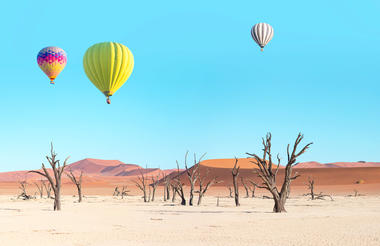
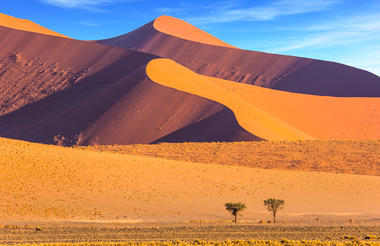
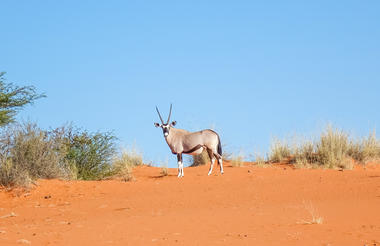
Time to shop for supplies this morning before you head off for the desert. There are several good supermarkets in Windhoek where you can stock up for your entire trip leaving you free to just enjoy Namibia's wide open spaces in peace and solitude.
We are also happy to provide a starter pack for your trip which leaves you free to set off straight away with no need to shop - just let us know.
This morning you can drive south to the Namib Rand Nature Reserve before heading off to Sesriem.
The landscapes here are remarkable and the reserve has a healthy population of desert dwelling wildlife including Oryx, Springbok, Hartmanns Mountain Zebra and Ostrich
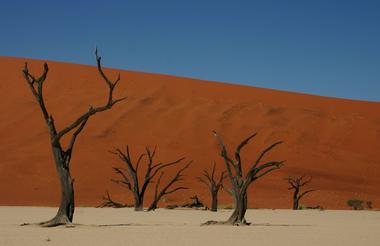
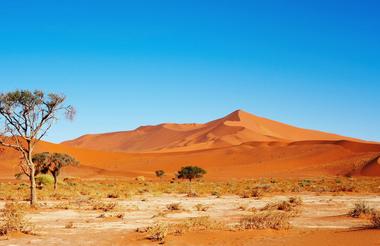
After your morning in the Namib Rand you head north to Sesriem and the gate to the National Park.
Just outside the gate is your private campsite for the next 2 nights, Sossus Oasis. Here you will have your own pitch and food preparation area along with your own ablutions.
If you decide to drive into the park this afternoon you will have to complete the gate procedures
When you arrive at the park gates the security guard will take your vehicle details and then you can pay your park fees for both days at the park reception 100 metres down the road before heading into the park itself
You have a full day today to enjoy Namibia's famous sand dunes.
Not only do you have the chance to walk to Dead Vlei with its ancient forest but also to Sossusvlei itself and climb Big Daddy.
It's best to take a lunch pack with you and the fuel station shop has a good supply and fresh bread.

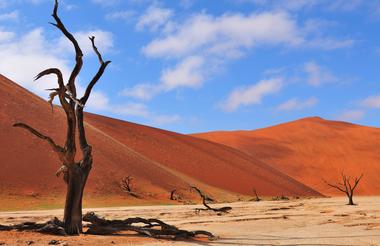
You can leave your campsite before dawn to drive the 70km to Namibia's highest dunes.
The road is tar all the way to the 2x2 car park where you can leave your motorhome and catch one of the shuttle vehicles the last 6km to Dead Vlei and Sossusvlei.
A long drive today but an interesting one, over the Tropic of Capricorn and on through the Kuiseb Canyon until you eventually reach the coast at Walvis Bay. From here it is just a 40 km drive along the Atlantic to Swakopmund. This quirky seaside town is Namibia’s adventure capital and over the next two days your choices of activities range from sky diving or sand boarding to quad biking. Our personal favourites are spending time on the ocean on a seal and dolphin tour where the cape fur seals often join you on the boat for a close up and personal encounter, and an adventure down to Sandwich Harbour 50 km south through the Namib where the mighty Atlantic crashes directly onto the dunes.
Your accommodation is at Alte Brucke Resort which has lovely private camping pitches where you will have your own ablutions and kitchen area.
Swakopmund has a huge variety of restaurants and cafes to suit all budgets and all are within walking distance from Alte Brucke



Highlights en route: Tropic of Capricorn, Canyons, Hartmaan’s Mountain Zebra.
Highlights at the coast: Cape Fur Seals, Flamingos, Dolphins, Mola Mola, Whales,
Desert dwellers including Namaqua Chameleons and Sand Diving Lizards.
Action packed activities, great restaurants and shopping opportunities.
As well as having some of Namibia’s best restaurants and interesting shops, Swakopmund is a perfect stop over between the desert landscapes of Sossusvlei and the wildlife rich areas in the north.

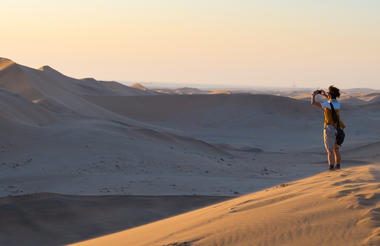
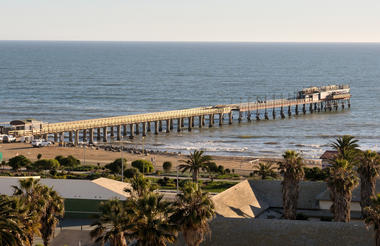
Many of Swakopmund's activities can be enjoyed privately and our particular favourite is a full day tour down the Skeleton Coast to Sandwich Harbour.
Your guide will spend time at Walvis Bay lagoon with its many bird species including pelicans and flamingos before heading onto the beach and driving south to Sandwich., dodging the incoming waves as you go.
On the way back you are taken on a roller coaster ride over the enormous coastal dunes back to town
You set off across the country today along the main tar road east before turning north towards the rocky outcrop known as Spitzkoppe and on into the Erongo Mountains and to the lovely Camp Mara.
Mara has beautiful private campsites along the banks of the dry Omaruru River and has glorious views of the Erongo Mountains.

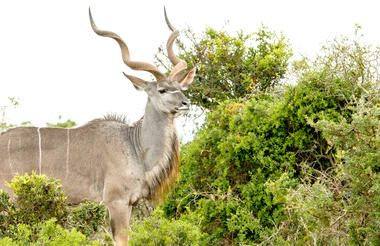
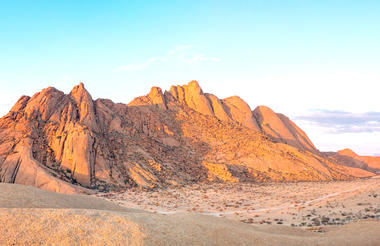
For keen birders the Erongo Mountains are very rewarding with Rosy-Faced Lovebirds and Black Eagles often seen amongst the giant boulders that make up the landscape but it is also home to many mammal species including giraffe, kudu, springbok, oryx and black rhino
Ensure you refuel before you leave Swakopmund and top up your supplies if you are running low
You complete your journey to Etosha today with a drive on up the country to the small town of Outjo where you can refuel and enjoy something tasty from Outjo Bakery before you drive the last 80km to Toshari Camp just a few kilometres from the Andersson Gate in southern Etosha.
You should have time for an afternoon drive in Etosha before returning to you private campsite at Toshari



Toshari offers three private campsites, each nestled under a canopy of mopane trees with their own personal ablution facilities.
The main lodge is within walking distance from the campsite, allowing campers access to on-site lodge facilities such as wifi, the bar, curio shop and swimming pools.
All camping guests are invited to dine at the lodge restaurant for breakfast, lunch or dinner, and join one of our guided excursions to Etosha National Park if they wish
Each campsite comes equipped with: An interlocked stand for your vehicle, Shade awning, Private ablution facilities including hot running water and a flush loo, electric lights, a power outlet and a BBQ
This huge park is home to an amazing diversity of wildlife and the area around Okaukuejo is known for its open plains and wide vistas where vast herds of herbivores trek endlessly to waterholes followed by the ever-present carnivores looking for their next meal.



The park gate opens at sunrise and the gate keeper will take your registration and ask how long you will stay.
As you will spend the next 3 days in Etosha it is best to pay your park fees for all the time you will be in the park to save going through the formalities on a daily basis.
Park fees are payable at Okaukuejo Camp at the MET desk on the left hand side
You have a full day today to head right across the park heading east to the Onguma Game Reserve which borders the eastern side of Etosha.
Your next 2 nights will be at the Tamboti private campsite iand from here you can enjoy the wildlife rich acacia woodland around Fischer’s Pan.
Not only is this area home to some of Etosha’s largest lion prides, cheetah sightings here are frequent, this area is home to the majority of the park’s giraffe and it is one of the best places in Africa to see the world’s smallest antelope, the diminutive Damara Dik-Dik.



Inside the camps there are sightings books in reception so ensure you check it before setting off for your game drives.
You will also have a complimentary copy of Kathryn's book "The Photographer's Guide to Etosha National Park" which will help you find the hot spots
Onguma also has a lot of wildlife within the reserve including lion and elephant and there is an underground hide at a waterhole which gives a nose high view of the animals as they come to drink
Namutoni Area Highlights: within a few kilometres from camp there are several excellent waterholes and two in particular are productive all day. There is a very large hyena clan near one of the waterholes and the members are often seen returning to their den early in the morning. All the main carnivores are often spotted in this area and cheetah are often seen hunting around Fischer’s Pan. Good area for lion, hyena, leopard, cheetah, elephants, black rhino, damara dik-dik, all plains game, warthogs and mongooses. Flamingos and pelicans can be seen in Fischer’s Pan after the rains
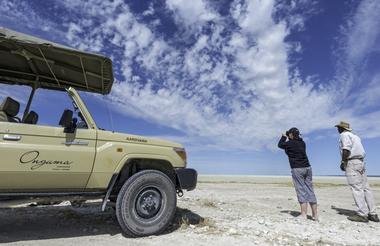


Evening drives are best spent at two productive waterholes,: Chudop is good both early morning and all day for herbivores, especially giraffe. For the last hour Klein Namutoni waterhole is often very rewarding and has perfect photographic light and offers the added bonus of a superb African sunset on the way back to camp.
After a final game drive, you leave the peace and quiet of Onguma and head south on the tar road until you reach the gates to Okonjima. The Omboroko Campsite lies a further 24 km into the middle of the mountains and it is here you will spend your last night in this luxury campsite. Activities in the game reserve include tracking leopard and hyena from an open vehicle with the aid of a telemetry and visiting the Africat Foundation. With its private campsite with all amenities including a swimming pool and genuine conservation story, Okonjima is always a highlight of any trip to Namibia.



Ensure you refuel your motor home en route to Okonjima as the road between the lodge and Windhoek only has one fuel station and occasionally runs out of fuel.
Africat is a non-profit organisation set up to support conservation through education and to help secure the future of Namibia's endangered carnivores.
With opportunities to track leopard in the 54,000 acre reserve and the new Endangered Wildlife Trail. Okonjima gives you chances to see some of Africa's rarely seen animals such as brown hyena, aardwolf, aardvark and pangolin
Whilst staying at Omboroko you will be able to actively observe part of this programme and understand how Africat aims to protect and rehabilitate these endangered carnivores.
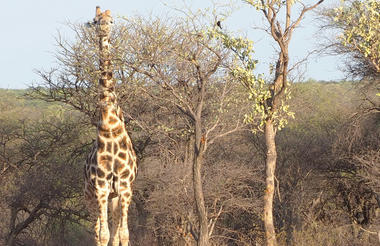
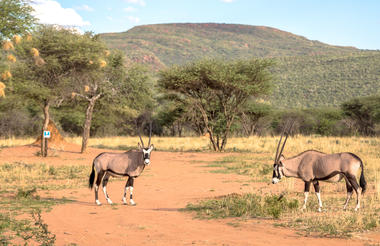
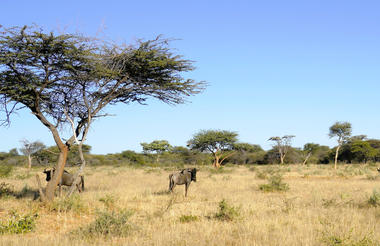
Your private campsite is one of only four which are spread out around a central swimming pool.
You will have all the facilities you need here in a true luxury campsite and often the local nocturnal wildlife joins you as you enjoy your evenings around the fire and warthogs carefully manicure the lawn around the pool.
After a final morning activity you can pack up your camper and drive the three and a half hours back to the Trans Kalahari Inn for your last night in Namibia.
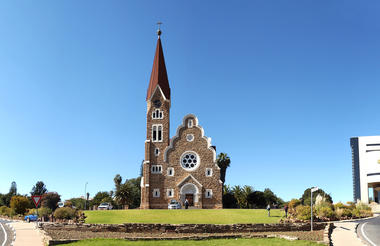


The Trans Kalahari Inn has an excellent restaurant and cosy bar so you can enjoy a last evening sundowner on the terrace before a sumptuous meal at the Inn
Today you will be transferred the short distance back to the airport in time for your onward flight home





